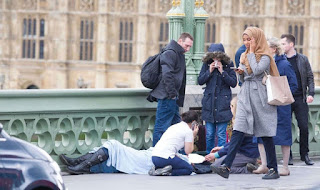A good example is highlighted by the Dalai Lama when he reminds us of is our own propensity to see violence as glamorous rather than to see relational harmony as the preferred norm. However, If we doubted this propensity to blindness in any way we need only look at the immediacy of the judgements of the twitter-sphere and social media over the past few days to see this blindness in operation. It is inherent in all of us, as we make judgements of others in terms of our own experiences and our own imaginaries. The issue with this ultimately biased view point is that we are quite capable of not seeing the marginalised, the fringe dwellers, those that we judge as being beneath, literally and figuratively, our notice. It is only when those that are on the margins make a big enough nuisance of themselves, the blind man (John 9), that we take notice of our own challenged views. Even then we may do nothing about them as we are too blinded by our own thoughts that we cannot conceive of an alternate way of seeing. This blindness can overtake us in everything that we do, not only in the public realm but also in the private and the faith dimensions of our lives. Everything that we do is coloured by our pre-judgements.
Our blindness leads to our not seeing with God's eyes
In our Lenten journey we are asked to face up to the more difficult aspects of our lives. One of these is really looking at ourselves and acknowledging our own faults so that we can seek God's grace and Spirit to guide us into a new space of possibility. It is only when we begin to see through the eyes of God that we begin to understand our relationships and develop our community. The commandment is to 'love our neighbours as ourselves', if we are unable to acknowledge, let alone love, our own faults how can we manage to love our neighbours. It is often this task of self acknowledgement that we neglect and avoid. Samuel is chastised for his lack of effort at the beginning of the reading (1 Sam. 16.1-13) and proceeds to compound this lack by using his own judgements to second guess God. It is only when David comes that he realises that God judges on other criteria and not the criteria we as humans use. In looking around at ourselves we should be strong enough to understand that our pre-judgements are not those of God.
It is when we actually 'get over' our own self doubts and self indulgences that we begin to realise that God is actually affirming and drawing the people of God into new relationships. The joy and the wonder that is God's presence in our lives is only truly visible when we place ourselves on hold. Samuel finally realises that by working with God the world is changed. Like the blind man we must accept the Spirit of God in our midst, even if it looks strange because we are seeing it with a new openness that was not there before. We ourselves are blind until we allow God in to change our sense of perception. To be holy is to see the world through the eyes of God and to further God's demand for justice and peace.

No comments:
Post a Comment